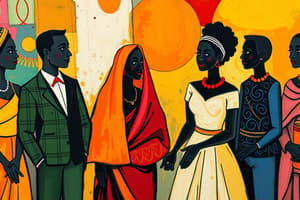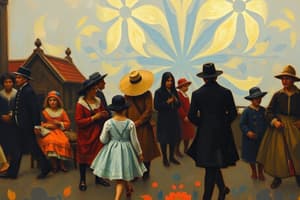Podcast
Questions and Answers
Which term refers to the highest good or the ultimate goal in an ethical system?
Which term refers to the highest good or the ultimate goal in an ethical system?
- Summum Bonum (correct)
- Sanction
- Maxim
- Folkway
What is the significance of folkways in society?
What is the significance of folkways in society?
- They are completely unique to each individual.
- They result from conscious decision-making only.
- They are enforced through strict laws.
- They contribute to the emergence of mores. (correct)
Which of the following best describes the role of elders in establishing social norms?
Which of the following best describes the role of elders in establishing social norms?
- They insist on adherence to accepted norms and standards. (correct)
- They are indifferent to cultural practices.
- They encourage individuals to reject tradition.
- They allow freedom of expression without guidance.
What characterizes habits within a cultural context?
What characterizes habits within a cultural context?
Which statement about customs is accurate?
Which statement about customs is accurate?
What can be inferred about the relationship between folkways and mores?
What can be inferred about the relationship between folkways and mores?
Which of the following best explains the term 'value-laden'?
Which of the following best explains the term 'value-laden'?
Which statement accurately reflects the role of customs in society?
Which statement accurately reflects the role of customs in society?
Which of the following is true regarding the learning of culture?
Which of the following is true regarding the learning of culture?
How can 'sanctions' best be defined in the context of societal norms?
How can 'sanctions' best be defined in the context of societal norms?
Flashcards
Folkways
Folkways
Traditional ways of behaving in a society.
Mores
Mores
Practices that become ingrained norms, often with strong social consequences for violating them.
Sanctions
Sanctions
Penalties for breaking rules or laws.
Customs
Customs
Signup and view all the flashcards
Habits
Habits
Signup and view all the flashcards
What is a 'sanction' in the context of social rules?
What is a 'sanction' in the context of social rules?
Signup and view all the flashcards
How do 'folkways' relate to 'mores'?
How do 'folkways' relate to 'mores'?
Signup and view all the flashcards
What's the role of 'imitation' in cultural learning?
What's the role of 'imitation' in cultural learning?
Signup and view all the flashcards
What is the 'Summum Bonum'?
What is the 'Summum Bonum'?
Signup and view all the flashcards
What are 'value-laden' practices?
What are 'value-laden' practices?
Signup and view all the flashcards
Study Notes
The Role of Society and the Individual in the Emergence of Mores
- Practices are seen as the most practical way to act, thereby establishing traditions.
- Imitation of best practices from other groups is common, leading to cultural learning.
- Elders, as authority figures, enforce norms and standards, ensuring conformity.
- Learning cultural norms can be unconscious, involuntary, and natural.
- Folkways, the initial standards, evolve into mores, representing more rigid norms.
Freedom in the Context of Morality
- Sanctions: Penalties for violating laws or rules.
- Customs: Traditional ways of behaving specific to a given culture or location.
- Habits: Regular, ingrained tendencies or practices.
- Obnoxious: Extremely unpleasant behaviors.
- Instinct: Natural, intuitive ways of acting.
- Phenomena: Objects of perception, observed realities.
- Maxim: Concise statements summarizing general truths.
- Summum Bonum: Highest good, the ultimate goal of ethical systems.
- Sentient: Capable of perception and feeling.
- Value-laden: Implied acceptance of specific values.
- Casual: Relating to a cause-and-effect relationship.
Folkways
- Folkways refer to the notion of “right” and “true.”
- Examples include games, hospitality, and dress codes.
Studying That Suits You
Use AI to generate personalized quizzes and flashcards to suit your learning preferences.
Related Documents
Description
Explore the complex relationship between society and the individual in shaping mores and moral frameworks. This quiz delves into how traditions, cultural norms, and authority figures influence our behaviors and ethics. Understand the evolution from folkways to mores and their implications on freedom and morality.





